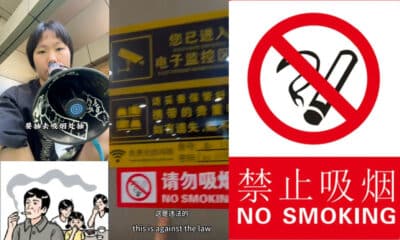China World
Chinese Netizens Argue Over Ivanka Trump’s Visit to the Chinese Embassy New Year’s Party
The visit of Ivanka Trump and her 5-year-old daughter Arabella to the Chinese Embassy’s New Year’s Party has stirred online discussions in China.
Published
9 years agoon
By
Yue Xin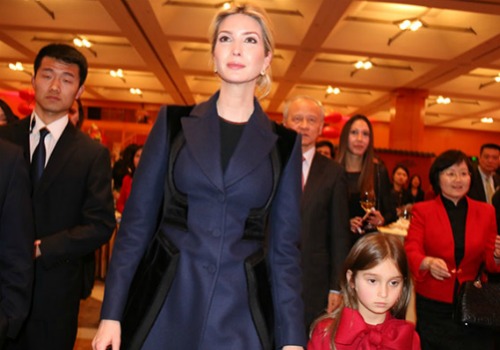
The visit of Ivanka Trump and her 5-year-old daughter Arabella to the Chinese Embassy’s New Year’s Party has stirred online discussions in China. While many appreciate the charm offensive, there are also those who criticize Trump’s failure to send greetings for the Lunar New Year.
While people around the world have responded with panic and despair to the inauguration of controversial US president Donald Trump and the implementation of his new policies, many Chinese netizens on microblog Sina Weibo seem to be somewhat excited about the turmoil that Trump is stirring up on the world stage.
The recent moves of Trump and his daughter Ivanka at the start of the Chinese New Year again caused a flood of jokes and lively discussion on Chinese social media.
“Ivanka’s recent charm offensive seems to indicate that she will play an important social role in improving the image of Trump’s administration.”
The Year of the Rooster has just started and many state leaders have sent their happy new year wishes to China and the overseas Chinese in their countries through online videos and letters. The new year’s wishes of UK Prime Minister Theresa May even went viral on Chinese social media with many comments about this “very dignified lady with the cute accent.”
Donald Trump, however, was blamed for his silence; he did not send out any public Lunar New Year’s this year, with which he has broken “another” tradition that American presidents kept over the past decades.
But Trump’s disregard for this tradition seemed to be partly made up for on Wednesday night, when first daughter Ivanka Trump paid a visit to the Chinese New Year party at the Chinese Embassy in Washington DC. She also brought her 5-year-old daughter Arabella, whose video of reciting ancient Chinese poetry became popular on Chinese social media several months ago.
Ivanka’s visit to the embassy did not go unnoticed in China; the hashtag “Trump’s Daughter Visits Chinese Embassy” even jumped up to one of the most-searched Weibo topics on Thursday.
A video from the Chinese Embassy showed Ivanka and Arabella accompanied by Ambassador Cui Tiankai, visibly enjoying themselves throughout the tour around the embassy’s festivities.
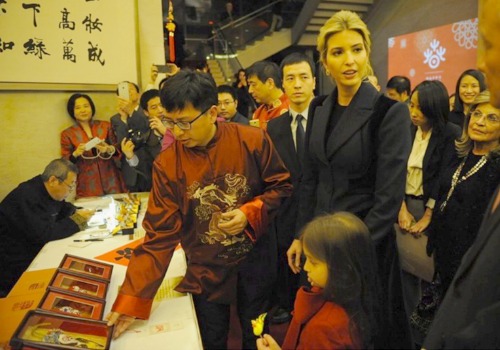
Arabella, a little bit shy, seemed to appreciate paper cutting, the sugar sculptures in the Chinese traditional art exhibition, and the traditional musical performances performed by Chinese musicians.
On Thursday, Ivanka posted a new video of Arabella singing a Chinese New Year song in Mandarin. She also wrote the Chinese characters “新年快乐” (Happy Chinese New Year) on Twitter and Instagram.
Arabella singing a song she learned for #ChineseNewYear. Wishing everyone an amazing year to come during these days of celebration. 新年快乐! pic.twitter.com/jxHHLvhmzm
— Ivanka Trump (@IvankaTrump) February 2, 2017
Although Ivanka has no official function in the Trump administration, her recent charm offensive seems to indicate that she will play an important social role in improving the image of Trump’s administration – especially when it comes to China.
“Trump must have saved the world in his previous life that he is so fortunate to have such a great daughter.”
On Sina Weibo, Chinese netizens expressed different opinions towards Ivanka’s visit and the lack of Donald Trump’s New Year’s wishes.
“Trump’s daughter is a lot more sensible than he is. Trump must have saved the world in his previous life that he is so fortunate to have such a great daughter!”, one Weibo user wrote, claiming that Ivanka, fulfilling a role as First Lady, should actually be called “First Princess.”
Other Weibo users praised Ivanka’s beauty by jokingly writing things such as: “How lovely the daughter and granddaughter are! Does Trump need a Chinese son-in-law in the future?”
But not all netizens could appreciate Ivanka’s charm offensive, and criticized Trump’s impoliteness and cunning strategy: “Does he think Chinese people are so easily tricked? Let Trump play the bad guy and his daughter play the good one? Where’s her dad? He’s the one who should be here!”
Despite the lack of Trump’s well wishes for the New Year, hundreds of Chinese companies seized the opportunity to make the first step and to wish him and all Americans the best in the Year of Rooster via the Times Square billboard.

According to some Chinese net users, showing one’s own best behavior is the best way to fight Trump’s impoliteness.
– By Yue Xin
Follow on Twitter or Like on Facebook
Featured image by China Daily.
©2017 Whatsonweibo. All rights reserved. Do not reproduce our content without permission – you can contact us at info@whatsonweibo.com.
Yue Xin is a bilingual freelance journalist currently based in the Netherlands with a focus on gender issues and literature in China. As a long-time frequent Weibo user, she is specialized in the buzzwords and hot topics on Chinese social media.

You may like
China Society
China Trend Watch Top 10: Putin & Kim Jong-un in Beijing, Meituan’s Upcoming Changes, Lu Xun’s Mural Controversy
From Kim Jong-un in Beijing to Lu Xun’s cigarette: what China’s talking about this week – a top 10 by What’s on Weibo.
Published
1 day agoon
August 28, 2025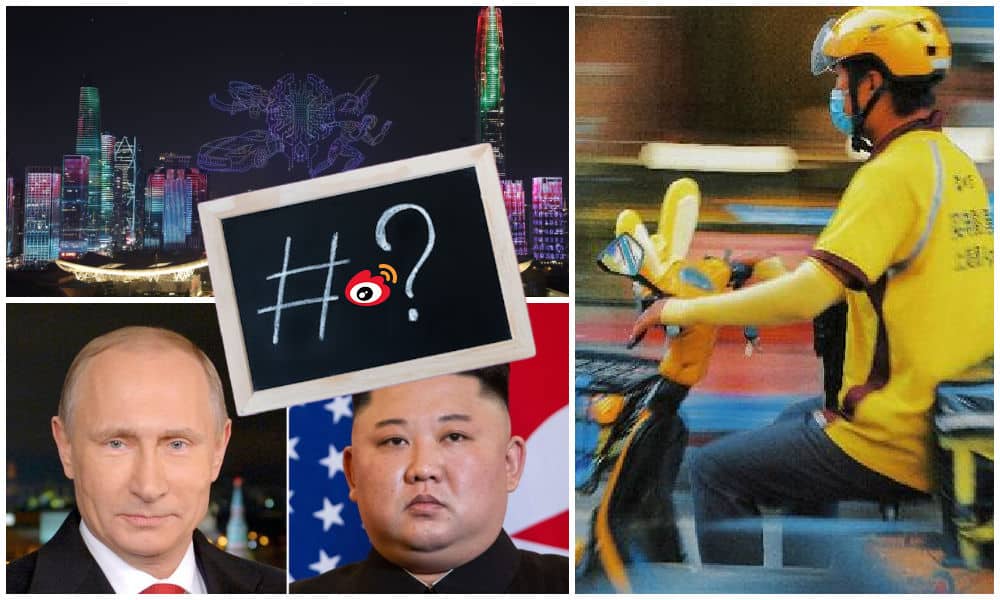
🔥What’s on Weibo’s Top 10: What’s Trending in China This Week (Week 35, 2025) Stay updated with China Trend Watch by What’s on Weibo — your quick overview of what’s trending on Weibo and across other Chinese social media. Trending topics curated by me, with help from my customized What’s on Weibo AI sidekick.
1. Putin and Kim Jong-un to Attend China’s WWII Victory Commemoration
These days, the upcoming September 3rd military parade is trending virtually every day on Chinese social media. On August 28, it was announced that Russian President Vladimir Putin and North Korean leader Kim Jong-un are both among 26 foreign heads of state and government leaders expected to attend China’s commemorative event marking the 80th anniversary of victory in the Second Sino-Japanese War and World War II. Leaders from countries including Cambodia, Vietnam, Iran, and Cuba are on the guest list, underscoring China’s global alliances amid tense geopolitical climates.
Manya’s Take: That Putin would attend the upcoming major parade is no surprise, but the presence of Kim Jong-un is more noteworthy—especially alongside other confirmed attendees, including leaders from Indonesia, Pakistan, Nepal, Iran, Myanmar, Malaysia, Vietnam, and others. At the same time, there is a clear absence of leaders from Western countries. According to state-linked Weibo commentator “Zhu Tianxia” (@煮天下), there is strong historical justification for Kim’s attendance. Yet he also emphasized that Trump’s absence is a loss for Washington, given Trump’s repeated statements that he wished to meet Kim, while US–Russia diplomatic efforts to end the war in Ukraine have so far yielded little progress. This makes the gathering of Xi, Putin, and Kim Jong-un in the heart of Beijing not just a commemorative event but a symbolic ‘win’ for China, underscoring its ever-growing and shifting role on the global stage.
2. ‘Not the Zong Fuli Era’: Zong Fuli on Wahaha Leadership After Zong Qinghou
On the first anniversary of her appointment as chairwoman of the Chinese food & beverage producer Wahaha Group (娃哈哈集团), Zong Fuli (宗馥莉, also known as Kelly Zong) gave an exclusive interview to Caijing (财经) magazine where she addressed succession, leadership challenges, and public controversies. Responding to the label of the Wahaha Group being in its “Zong Fuli Era” (宗馥莉时代), she dismissed the notion, emphasizing that a company belongs to “everyone who works hard within it,” not just a single individual. In the interview, Zong also spoke more about her views on running Wahaha, advocating long-term strategic growth over short-term results, and sharing her determination to not let controversy distract her from business operations.

Manya’s Take:
Zong Fuli has big shoes to fill. Her father, Wahaha founder and chairman Zong Qinghou (宗庆后), was one of China’s most beloved and respected businessmen. Since his passing in March 2024, Zong has also faced one controversy after another — from outsourcing some of Wahaha’s production to a cheaper water brand, to a high-profile family inheritance dispute involving three alleged illegitimate children living in the US. These issues have dented the company’s brand image. Her latest interview is therefore a timely one, in which Zong demonstrates resilience and determination to keep this much-loved Chinese brand thriving. Especially the fact that she’s staying humble (not wanting this to be he ‘Zong Fuli era’, is something many consumers are likely to appreciate, as humbleness was one of the reasons why people loved Zong Qinghou so much. Is it enough to undo the harm done to Wahaha’s brand image? Perhaps not, but it’s certainly a step in the right direction.
3. Meituan To Scrap Late-Delivery Fines By End-2025
An internal briefing from Chinese food delivery company Meituan (美团) said the platform will eliminate “overtime” penalties for delivery riders by the end of 2025. The company also highlighted “rider-friendly communities” (骑手友好社区) to ease entry to residential compounds via data-linked QR access; 24,700+ communities across 150 cities have reportedly been upgraded. The move follows long-running public concern over rider safety and algorithmic pressures. Many users welcomed the change while asking how timeliness metrics and customer expectations will be managed without fines.
Manya’s Take: In recent years, there has been more attention to the hardships faced by Chinese food delivery workers. Not only do they face many hard or unsafe circumstances while doing their job—from hot weather and thunderstorms to roads or communities that are difficult to enter—but their daily work is also monitored by algorithmic management tools that put extreme pressure on them to deliver their orders on time. Riders can get caught in “algorithm traps” (算法陷阱) because the faster they work, the stricter the algorithm tightens delivery windows, and they may face penalties or reduced earnings if they fail to meet the expected times. Although the cancellation of the late fees is good for drivers, many consumers are skeptical, arguing that their Meituan deliveries are already taking a lot of time—with late fees being canceled, people fear it will only take longer. With Meituan now facing fierce competition from others, including JD and Eleme, the new measure might end up working against Meituan in the food delivery war.
ALSO TRENDING & NOTEWORTHY:
4. Man Wearing Horror Mask on Highway Sparks Public Outrage
A video went viral on Weibo these days showing a man wearing a horror mask on the Changshen Expressway (长深高速), allegedly scaring nearby vehicles. The incident occurred on August 24 and was captured by another driver who claimed the masked man was intentionally frightening passengers. After an investigation, Hangzhou traffic police identified the individual as Hugo, a 42-year-old foreign teacher in Hangzhou, who was a passenger and claimed the mask was a spontaneous joke while retrieving snacks in the car. Police determined the act did not constitute a criminal offense but noted it could affect road safety. Although the incident triggered some online debates over road behavior and safety, many netizens also commented that the fuss was exaggerated given the lack of malicious intent or actual danger caused. But we do wonder if Hugo got into trouble at school 😂

The masked man that triggered controversy.
5. Shenzhen’s 12,000-Drone Light Show for 45th Anniversary
On August 26, Shenzhen celebrated the 45th anniversary of its Special Economic Zone with a record-breaking drone light show featuring 12,000 drones in a dual-venue performance at Renmin Square (市民广场) and Talent Park (人才公园). The show incorporated interactivity with the city lights and featured global artistic collaborations to tell a symbolic story about the history and transformation of the Special Economic Zone. The show drew tens of thousands residents and visitors from outside of Shenzhen, with some queuing five hours in advance. You can watch the full show here.
6. Xi Jinping Meets Cambodian Royalty Ahead of Anniversary
President Xi Jinping and First Lady Peng Liyuan met with Cambodian King Norodom Sihamoni and Queen Mother Monineath at Zhongnanhai on August 26. Xi invited King Sihamoni to attend China’s upcoming Tiananmen parade for the 80th anniversary of the victory in the War of Resistance Against Japan and World War II. The visit is part of ongoing efforts to deepen the “ironclad” friendship between China and Cambodia.
7. Lu Xun Smoking Mural To Stay At Shaoxing Tourist Site
A mural depicting Chinese famous writer Lu Xun (鲁迅) holding a cigarette at his native place in Shaoxing has sparked debate after a citizen petitioned for its replacement over youth influence concerns. Site staff clarified the mural will not be changed. The discussion touches on historical authenticity versus public health messaging in cultural heritage spaces. Many commenters argued the depiction reflects the era and the author’s real-life image, while others called for more youth-oriented guidance nearby.
Manya’s Take: Lu Xun (1881–1936) was known for his heavy smoking, which ultimately contributed to his early death. There are many images of him holding a cigarette, and today this has sparked more discussion among younger generations who are increasingly aware of the dangers of smoking, with more people actively involved in efforts to discourage it. The debate around Lu Xun and his cigarette is perhaps comparable to Walt Disney. It is known that photos of Disney at Disneyland were retouched to remove his cigarette, in order to hide his habit from the children visiting the park—a decision that remains somewhat controversial. In the end, Lu Xun is not Walt Disney, and his legacy is not about being a role model for children but about being a major cultural figure in early 20th-century China. In this context, smoking should neither be romanticized nor censored. Instead, Lu Xun’s heavy smoking—reportedly as many as 50 cigarettes a day!—should also serve as a warning about how harmful smoking is. Lu Xun died at just 56, and he smoked until the very end of his life.

The controversial Lu Xun mural.
8. Esther Yu Surrounded by Controversy, Public Calls for Transparency
The hugely popular Chinese actress Esther Yu / Yu Shuxin (虞书欣) is at the center of a growing public controversy. She’s lost more than 720,000 followers in just one week after two issues resurfaced. First, an old reality show clip went viral showing her making harsh remarks about co-star Zhang Haoyue (张昊玥). More significantly, Chinese financial blogger “Lao Pan Caishang” (老潘财商) accused Yu’s father of funneling RMB 1.5 billion in state funds through private companies and possibly committing tax fraud or falsifying financial data. Combined with reports about her family’s wealth and legal troubles, netizens are now questioning whether Yu’s career was helped by improper financial backing. While the original allegations surfaced months ago, *Jimu News* is now calling for Yu’s team—and state authorities—to publicly address the matter and provide transparency.
9. “Middle-Class Darling” MUJI Faces Mass Closures Across China
Japanese lifestyle brand MUJI (无印良品) is facing a “closure wave” across China, shutting down numerous stores in cities including Beijing, Shanghai, Suzhou, Wuhan, and Changsha. Multiple branch managers cited declining foot traffic and reduced profitability. In response, MUJI’s official statement described these closures as a “normal operational adjustment.” Yet for many, the downsizing of what was once considered the “white moonlight of the middle class” (中产的白月光)—a hugely popular symbol of minimalist, middle-class lifestyle—is noteworthy. The news trended alongside reports of liquidation discounts and local store shutdowns. Quality controversies, such as a student scissors product failing safety inspections, have previously added pressure to MUJI’s reputation in China. Reactions are mixed: while some express continued love for MUJI, others complain that it is more expensive in China than in Japan, despite being manufactured locally.
10. Southwest University Faces Backlash Over “Food Delivery Monopoly”
Southwest University (西南大学) has sparked heated debate among students after announcing that the so-called “Xiaoshenghuo” (校生活) app (the “Campus Life” app) would become the sole authorized food delivery platform on campus. Under the new policy, outside couriers from food delivery companies like Meituan and Ele.me can no longer enter dormitory zones, with orders funneled through the designated app for secondary delivery to pickup lockers. The university said the change was meant to fix problems of lost or misplaced orders, but students worry about reduced choice, higher prices, and poorer efficiency. Reports note that the chosen company previously faced fines for food safety compliance failures, further intensifying suspicions of unfair contracting. Student feedback highlights longer delivery times, fewer restaurant options, and hidden costs—raising concerns that the school’s management measures are edging into monopoly territory.
The China Trend Watch series combines AI-powered trend detection with editorial curation. AI tools — set up and customized by What’s on Weibo — help identify top trends and draft outlines, while Manya Koetse selects what’s most noteworthy, fact-checks, rewrites, and edits for context.
China Insight
From Trade Crisis to Patriotic Push: Chinese Online Reactions to Trump’s Tariffs
“This moment is the time to reflect on our unity. If we can choose domestic alternatives, we should.”
Published
5 months agoon
April 5, 2025
“China’s countermeasures are here” (#中方反制措施来了#). This hashtag, launched by Party newspaper People’s Daily, went top trending on Chinese social media on Friday, April 4, after President Trump announced steep new tariffs on Wednesday, including a universal 10 percent “minimum base tariff” on all imported goods and especially targeting China with an additional 34% reciprocal tariff as part of so-called “liberation day.”
Countermeasures were announced on Friday. China’s State Council Customs Tariff Commission Office (国务院关税税则委员会办公室) issued an announcement stating that, starting from April 10, an additional 34% tariff will be levied on all imported goods originating from the United States, on top of existing tariff rates.
Other countermeasures include immediate export restrictions on seven key medium to heavy rare earth elements, which are important for manufacturing critical products used in semiconductors, defense, aerospace, and green energy.
“This won’t make America great again”
The official response to the tariffs, both from state media and the government, has been twofold: on the one hand, it criticizes the U.S. for placing American interests above the good of the global community, arguing that the move only hurts the U.S., its people, and the world. On the other hand, the Chinese side stresses that although they do not believe tariff wars are the answer, China is not afraid of a trade war and will not sit idly by, but will respond with equal measures.
Chinese official media have condemned the new tariffs, which led to the largest single-day market drop in years. Describing the reactions of various experts, Xinhua News highlighted a comment by a Croatian professor, stating that the policy will only increase export prices and worsen inflation, ultimately hurting middle- and working-class Americans — and noting that the policy “won’t make America great again” (不会“让美国再次伟大”).
The official announcement by Chinese state media regarding China’s countermeasures received widespread support in its (highly controlled) comment sections, with both media outlets and netizens echoing the message that China will not be bullied by the U.S.
On Xiaohongshu, similar sentiments shnone through in popular posts, such as one person writing:
💬 “Congratulations to the U.S. on receiving a 34% tariff on all its goods! Luckily, very few of the things ordinary Chinese people eat or use come from the U.S. anyway.
#RMB purchasing power #China will inevitably be unified #Consumer confidence #Contemporary Chinese economy #Carrying forward the construction of a Beautiful China”
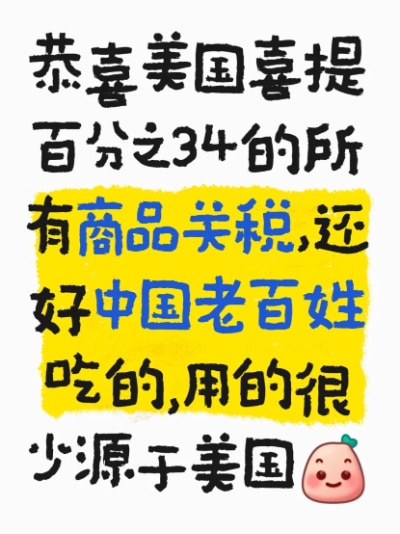
“Monday’s stock market will be a bloodbath,” another commenter wrote.
One Weibo blogger (@兰启昌) saw the recent developments as another sign of an ongoing trend of “de-globalization” (逆全球化).
But beyond global economics and geopolitics, many Chinese netizens — from Weibo to Xiaohongshu — seem more focused on how the new policies will affect everyday consumers.
Netizens have been actively discussing which goods will be hit hardest by the new tariffs. Based on 2023 trade data, here’s a breakdown of the top exports between China and the United States — and the sectors most likely to feel the impact.

🔷🇺🇸🇨🇳Top 10 Chinese Exports to the U.S.
1. Electronics and Machinery
Includes smartphones, laptops, tablets, integrated circuits, and image processing equipment.
2. Furniture, Home Goods & Toys
Such as video game consoles, lamps, and much more.
3. Textiles and Apparel
Garments, footwear, and accessories like sunglasses.
4. Metals and Related Products
Especially steel and steel-based items.
5. Plastic and Rubber Products
Widely used in packaging, manufacturing, and consumer goods.
6. Transportation Equipment
Electric vehicles, passenger cars, motorcycles, scooters, and drones.
7. Low-Value Commodities
Bulk items used in general trade and low-cost manufacturing.
8. Chemicals
Industrial chemicals and related materials.
9. Medical and Optical Instruments
Includes medical devices and precision instruments.
10. Paper Products
Ranging from office supplies to industrial paper goods.
🔹🇨🇳🇺🇸Top 10 U.S. Exports to China
1. High-Tech Machinery and Electronics
Especially integrated circuits, turbine engine components, and semiconductor manufacturing equipment.
2. Energy Products
Crude oil, liquefied propane and butane, natural gas, and coking coal.
3. Chemicals and Pharmaceuticals
Includes cosmetics, cleaning agents, and various medical drugs.
4. Soybeans
A key agricultural export widely used in food and animal feed in China.
5. Transportation Equipment
Such as automobiles and aircraft parts.
6. Medical and Optical Devices
Medical precision equipment, diagnostic tools, and lab instruments.
7. Plastic and Rubber Goods
Used in both consumer and industrial sectors.
8. Metal Products
Primarily iron and steel exports.
9. Wood and Pulp Products
Lumber, wood pulp, charcoal, and paper goods.
10. Meat
Including beef, pork, and poultry.
Those doing trade with the US, or otherwise involved in made-in-China products, like those working clothing and furniture factories, will inevitably be affected by the tariffs.
“Patriotism isn’t just a sentiment – it’s an action”
Much of the popular online conversation has focused on concrete examples of what kinds of things might get more expensive for Chinese consumers in their everyday lives.
Some bloggers noted that people might start to see price hikes in everyday groceries like dairy, meat, corn, and soybeans. With fewer soybeans coming in from the US, cooking oil prices may also rise.
China is the world’s largest consumer of soybeans, but because domestic production is relatively low, soybeans remain a key import.
Then there are popular American brands in the Chinese market that are expected to get pricier too — like beauty and health products, Starbucks coffee, or Häagen-Dazs ice cream.
Some also predicted a 30% to 40% increase in prices for iPhones and other Apple products.
Contrary to the earlier comment by the Xiaohongshu blogger, some netizens explain just how many American products are actually used by Chinese consumers, with many American companies operating in China — from McDonald’s and Coca-Cola, Walmart to Disney or Warner Brothers, Procter & Gamble to Colgate and Estée Lauder.
What’s noteworthy in these discussions, however, is a strong tendency to point to Chinese alternatives and encourage smart buying instead of following hypes (“理性替代,拒绝跟风”): No need to panic about soybeans — there are domestic alternatives, and China’s own soybean program is getting a boost. Who needs Starbucks when there’s Luckin Coffee? Why buy an iPhone when you can get a Huawei? Skip the Tesla, go for a BYD.
In these discussions, the ‘crisis’ is turned into an ‘opportunity’ for Chinese companies to focus even more on the Chinese market, and for Chinese consumers to, more than ever, actively embrace and celebrate local brands and made-in-China products.
One Chinese blogger (@O浅夏拾光O) wrote:
💬 “This moment is the time to reflect on our unity. If we can choose domestic alternatives, we should. For example, we can use rapeseed oil or peanut oil instead of imported soybean oil; we can buy cost-effective Chinese electronics instead of foreign brands. Support domestic products and respond to the nation’s call to expand domestic consumption.
We must have faith in our country. Only by uniting as one, young and old all together, the entire country working together, can we withstand all hazards. As Professor Ai Yuejin (艾跃进) once said, patriotism isn’t just a sentiment – it’s an action. As long as our core is stable and we are united in spirit, no hardship can defeat us.”
Despite the major happenings and the big words, some people just care about the small things: “As long as KFC and McDonald’s don’t raise their prices, it’s all fine by me.”
See the follow-up to this article here.
By Manya Koetse
(follow on X, LinkedIn, or Instagram)
Spotted a mistake or want to add something? Please let us know in comments below or email us. First-time commenters, please be patient – we will have to manually approve your comment before it appears.
©2025 Whatsonweibo. All rights reserved. Do not reproduce our content without permission – you can contact us at info@whatsonweibo.com.
Subscribe
What’s on Weibo is a reader-supported publication, run by Manya Koetse (@manyapan), offering independent analysis of social trends in China for over a decade. To receive new posts and support our work, consider becoming a paid subscriber.

Get in touch
Would you like to become a contributor, or do you have any tips or suggestions? Get in touch here!

China Trend Watch Top 10: Putin & Kim Jong-un in Beijing, Meituan’s Upcoming Changes, Lu Xun’s Mural Controversy

China Trend Watch: Naked Sleeping Woman Claims Depression After Being Seen by Window Cleaners

Online Debates About China’s Train Traditions: No More Instant Noodles or Cigarette Breaks?

China Trend Watch: From Lhasa to Labubu

Dialogues Across Time: Remembering War in a New China

Hidden Cameras and Taboo Topics: The Many Layers of the “Nanjing Sister Hong” Scandal

Inside the Labubu Craze and the Globalization of Chinese Designer Toys

“Jiangyou Bullying Incident”: From Online Outrage to Offline Protest

The Next Labubu: What the Rise of Wakuku Tells Us About China’s Collectible Toy Wave

A Very Short Guide to China’s Most Popular Designer Toys
Popular Reads
-

 China Memes & Viral1 month ago
China Memes & Viral1 month agoHidden Cameras and Taboo Topics: The Many Layers of the “Nanjing Sister Hong” Scandal
-

 China Books & Literature10 months ago
China Books & Literature10 months agoThe Price of Writing Smut: Inside China’s Crackdown on Erotic Fiction
-

 China Society11 months ago
China Society11 months agoDeath of Chinese Female Motorcycle Influencer ‘Shigao ProMax’ Sparks Debate on Risky Rides for Online Attention
-

 China Insight4 months ago
China Insight4 months agoUnderstanding the Dr. Xiao Medical Scandal


